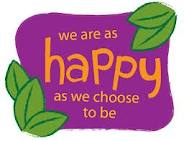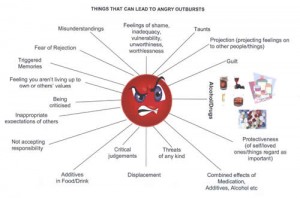Feelings are powerful. They dictate our actions, behaviours and beliefs – fact. They are so powerful that we have no control  over them – not fact. When we exercise power over our feelings we are choosing, to a much greater extent, how we feel. Our feelings are largely influenced by our thoughts and our thoughts are the result of our previous experiences, influences and beliefs in any situation. Therefore if you have learned to feel guilty if somebody around you is upset, you will most likely feel guilty. If your first reaction to perceived aggression is to retaliate in anger then you will become angry.
over them – not fact. When we exercise power over our feelings we are choosing, to a much greater extent, how we feel. Our feelings are largely influenced by our thoughts and our thoughts are the result of our previous experiences, influences and beliefs in any situation. Therefore if you have learned to feel guilty if somebody around you is upset, you will most likely feel guilty. If your first reaction to perceived aggression is to retaliate in anger then you will become angry.
So how can we go about reacting differently? The simplest way is to change our thoughts. And that’s where things become interesting. We have ultimate control over our thoughts. Nobody else has any power at all over them, unless we we give them that power. We can choose to perceive any situation, person or event in our own inimitable way. In order to change our thoughts we have to know that we are capable of doing so. If you believe a particular person will annoy you because he “always gets on my nerves” then chances are he is going to annoy you. If you tell yourself that he isn’t going to affect you anymore, you have a very strong chance that he won’t.
Give it a try. Next time you feel angry, sad, low, guilty, frustrated,  envious, upset or offended, don’t react, pause for thought. Literally. Be aware of what is going around your head, and then consider changing those thoughts. You can control your day to great effect if you get into the habit of re-thinking before re-acting.
envious, upset or offended, don’t react, pause for thought. Literally. Be aware of what is going around your head, and then consider changing those thoughts. You can control your day to great effect if you get into the habit of re-thinking before re-acting.
I would love to hear your comments about this or any other of my blogs. Please feel free to use the contact page.

 dy/mind. Right now your emotions may be a raging torrent of anger, frustration or desperation, or maybe a gentle loving stream of contentment, or even a pool of calm and peacefulness. Whatever type of emotion is present within you, it will affect your thinking, your behaviour and your perception of the current moment.
dy/mind. Right now your emotions may be a raging torrent of anger, frustration or desperation, or maybe a gentle loving stream of contentment, or even a pool of calm and peacefulness. Whatever type of emotion is present within you, it will affect your thinking, your behaviour and your perception of the current moment.  instead of frustration, and joy instead of anger, is to be more aware of our thoughts and to choose them wisely. If you don’t want to be unhappy, you can learn to challenge those unhappy thoughts, release them and change them for neutral or happy thoughts. If you no longer wish to feel stuck, then lift the lid to your thoughts and allow yourself to create the answers you need for change in your life. It may sound simple and that is because it is actually very straightforward.
instead of frustration, and joy instead of anger, is to be more aware of our thoughts and to choose them wisely. If you don’t want to be unhappy, you can learn to challenge those unhappy thoughts, release them and change them for neutral or happy thoughts. If you no longer wish to feel stuck, then lift the lid to your thoughts and allow yourself to create the answers you need for change in your life. It may sound simple and that is because it is actually very straightforward.  emotions and sticking to it. With a little determination, some support from people around you and maybe some professional guidance, you can decide to choose your thoughts and manage your emotions successfully.
emotions and sticking to it. With a little determination, some support from people around you and maybe some professional guidance, you can decide to choose your thoughts and manage your emotions successfully.
 on the other hand, is not good for anybody. It seeks to diminish the person you are angry at and at the same time diminishes you by making you feel bad. Even if you are able to justify your anger to yourself, you still have to convince other people that your behaviour is acceptable and that is not an easy task if your behaviour is inappropriate.
on the other hand, is not good for anybody. It seeks to diminish the person you are angry at and at the same time diminishes you by making you feel bad. Even if you are able to justify your anger to yourself, you still have to convince other people that your behaviour is acceptable and that is not an easy task if your behaviour is inappropriate.